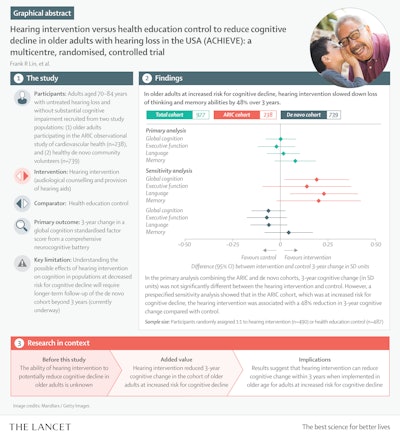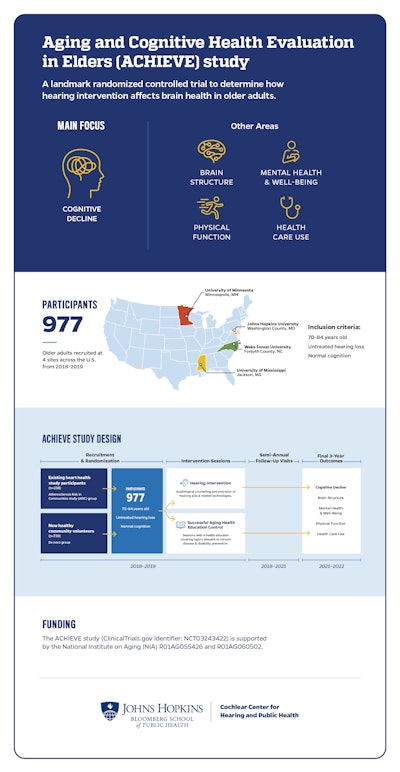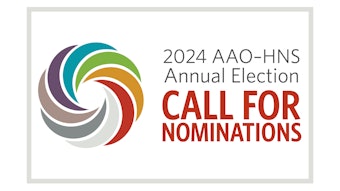Hearing Loss and Cognitive Decline: Results of the ACHIEVE Study
ACHIEVE study findings suggest that treating hearing loss may be a particularly important global public health target for dementia prevention efforts.
Frank Lin, MD, PhD, Co-Principal Investigator of the ACHIEVE study

Research over the past decade has begun to dig into the complex relationships between untreated age-related hearing loss and a host of health outcomes. By studying the effects of hearing loss in population-based studies, we now understand that hearing loss is associated with greater social isolation, falls, risk of hospitalizations and greater health care costs, and cognitive decline and dementia. In particular, among all known potentially modifiable risk factors for dementia, hearing loss has been estimated by the 2020 Lancet Commission on Dementia to be the single greatest risk factor for dementia that may account for 8% of all dementia cases worldwide.
There are three main mechanisms that have been hypothesized through which hearing loss may increase risk of cognitive decline and dementia.
First, degraded peripheral encoding of sound by the cochlea, which is the hallmark of age-related hearing loss, requires the brain to recruit and utilize additional cortical resources to decode and process these degraded signals coming from the cochlea. This cognitive load on the brain means that fewer cortical resources are available for supporting thinking and memory abilities and cognitive function.
Second, reduced auditory stimulation of the brain can lead to increased atrophy over portions of the temporal lobe responsible for auditory processing and cascading effects on brain structural integrity and function.
Third, hearing loss makes communicating with others more difficult, which can lead to social isolation, another risk factor for dementia.
These hypothesized mechanisms suggest that hearing interventions could potentially modify these pathways and reduce the risk of cognitive decline and dementia. For example, amplification with hearing aids could plausibly provide a clearer sound to the brain thereby reducing cognitive load, increasing brain stimulation, and improving social engagement. However, while this makes sense in theory, does this actually work in reality?
That is the question we set out to explore in the Aging and Cognitive Health Evaluation in Elders, or ACHIEVE, study, the first randomized trial to investigate whether hearing intervention can reduce long-term cognitive decline in cognitively healthy older adults. (ACHIEVE study also looks at other health outcomes, including mental health and well-being, physical function, and healthcare use; papers on those outcomes will be published over time.)

Reprint credit granted by The Lancet. https://www.thelancet.com/journals/lancet/article/PIIS0140-6736(23)01406-X/fulltext
The ACHIEVE study, published in The Lancet and presented at the Alzheimer’s Association International Conference in Amsterdam in July 2023, involved 977 older adults ages 70 to 84 years with untreated hearing loss, primarily in the mild-to-moderate range. Participants came from two distinct study populations: a group of adults who were already participating in the ARIC heart study (a longstanding study of a random sample of nearly 16,000 adults who have been followed for over 30 years in a study of cardiovascular health), and a group of healthy volunteers who were newly recruited from the community. The 238 participants who came from the ARIC heart health study were, on average, older and had more risk factors for cognitive decline than the 739 new healthy community volunteers.
Participants were randomly assigned to a hearing intervention, which involved sessions with an audiologist to get fitted for hearing aids and to learn how to use these devices to hear and communicate optimally, or to a health education control intervention, which involved individual sessions with a health educator covering topics relevant to chronic disease and disability prevention.
We followed participants for three years with tests of thinking and memory, using testing procedures to ensure hearing loss would not affect the accuracy of cognitive testing.
At the end of the three-year study when both groups of participants were analyzed together, the hearing intervention was not found to reduce cognitive decline compared to the health education control intervention.
However, the results were very different when we next looked at the effects of the hearing intervention separately in the group of ARIC heart study participants versus the group of new healthy community volunteers. In this preplanned sensitivity analysis, we found that the effect of hearing intervention on cognitive decline differed significantly between the two groups:
- In the group of participants from the ARIC heart study, who were at increased risk for cognitive decline, the hearing intervention reduced three-year cognitive change by 48%.
- In the newly recruited healthy volunteer group, who were at decreased risk for cognitive decline, hearing intervention had no effect on reducing cognitive decline.
What could account for such significant differences between these two study groups?
We believe that the effect of the hearing intervention on reducing cognitive decline was only apparent in the group of participants from the heart study because they had a nearly three-fold faster rate of cognitive decline over the course of the study than the healthy volunteer group. A faster rate of background cognitive change in those at greater risk of dementia and cognitive decline would allow us to see the beneficial effects of hearing intervention of slowing this decline within the limited span of the three-year study period.
In contrast, the healthy volunteer group who represented a self-selected group of community-dwelling older adults were healthier to begin with had very little cognitive decline over three years, making it difficult to slow down this minimal decline any further. Importantly, the hearing intervention could likely have the same beneficial cognitive effects in these participants, but these effects will take longer than three years to become apparent. We are continuing to follow all participants in the ACHIEVE study for another three years to look at longer term effects of hearing intervention on cognition and other outcomes.
These findings could have significant implications on clinical care and hearing care policy. On a granular level, for individual patients, the ACHIEVE study results show that hearing intervention may help older adults maintain their thinking and memory abilities as they get older, particularly in older adults at increased risk for cognitive decline. Treating hearing loss with hearing aids and related support services does not carry any health risks and there are also clear benefits for improving communication and improving social function.
On a population level, ACHIEVE study findings suggest that treating hearing loss may be a particularly important global public health target for dementia prevention efforts. This is an urgent issue: The world’s population is aging, and by 2050, over 150 million individuals are projected to be living with dementia. Hearing loss is a modifiable risk factor for dementia that could be addressed at scale to help reduce the risk of dementia and the cognitive decline that precedes dementia onset.
To realize these benefits, though, policy changes are needed in the United States and many parts of the world to increase access to and insurance coverage for hearing aids and related hearing technologies and the diagnostic and hearing care support services of an audiologist. Work in this area includes advancing action through continued support of the over-the-counter hearing aid regulations in the U.S., ongoing collaborations with the Consumer Technology Association to advance the Hearing Number initiative so consumers can monitor their hearing on their own with a smartphone (similar to tracking one’s own blood pressure or blood glucose), and legislative efforts to advance Medicare reform.
 Courtesy of Johns Hopkins Bloomberg School of Public Health. Permission required for reuse.
Courtesy of Johns Hopkins Bloomberg School of Public Health. Permission required for reuse.
Resources
Learn more about the study at www.ACHIEVEstudy.org
Reference
Lin FR, Pike JR, Albert, MS, et al. Hearing intervention versus health education control to reduce cognitive decline in older adults with hearing loss in the USA (ACHIEVE): a multicentre, randomised controlled trial, The Lancet, 2023, ISSN 0140-6736 https://doi.org/10.1016/S0140-6736(23)01406-X.




















